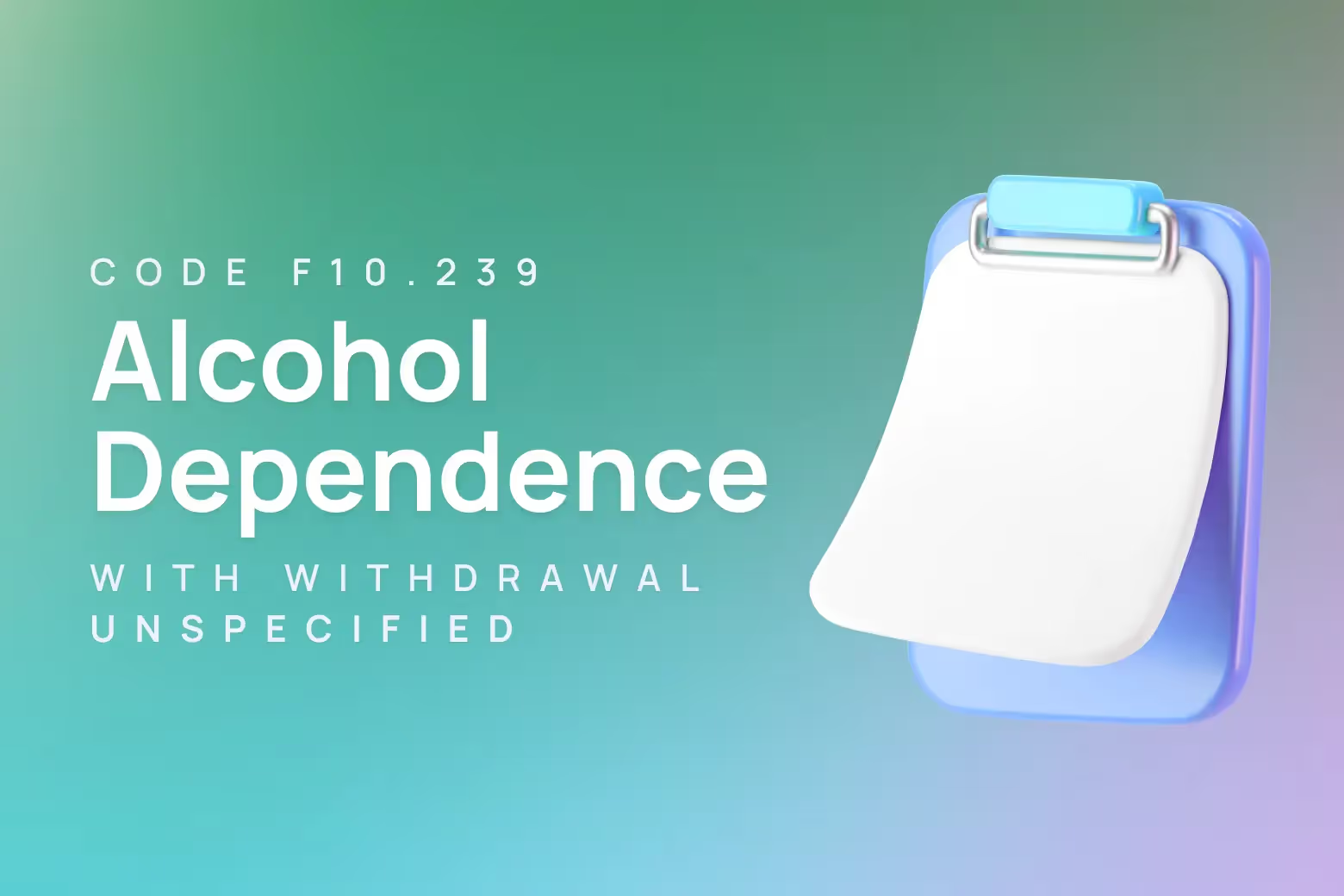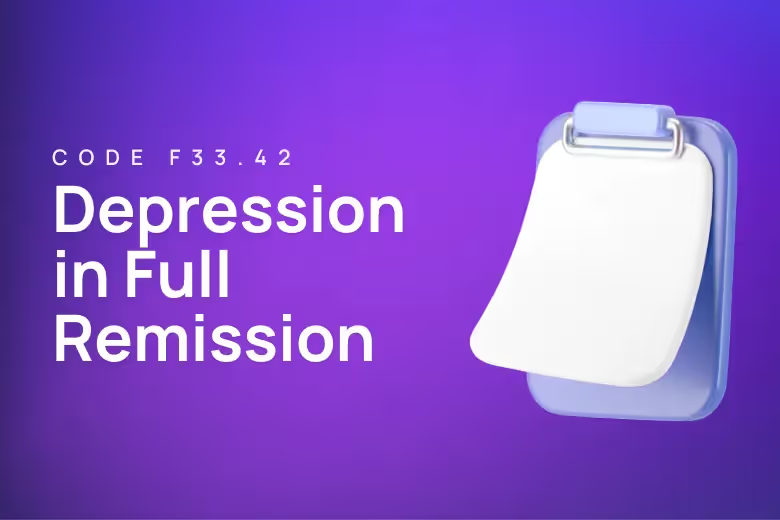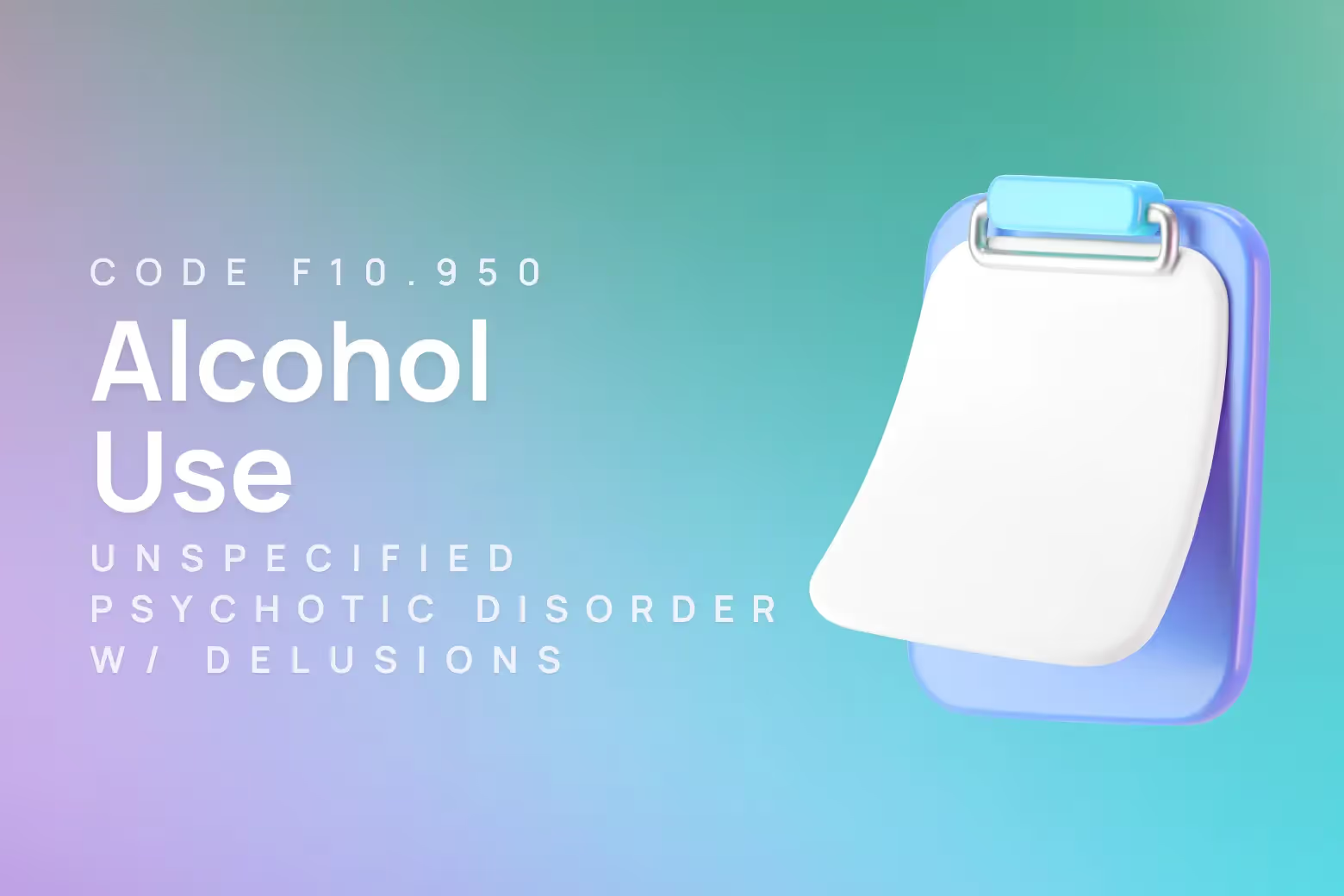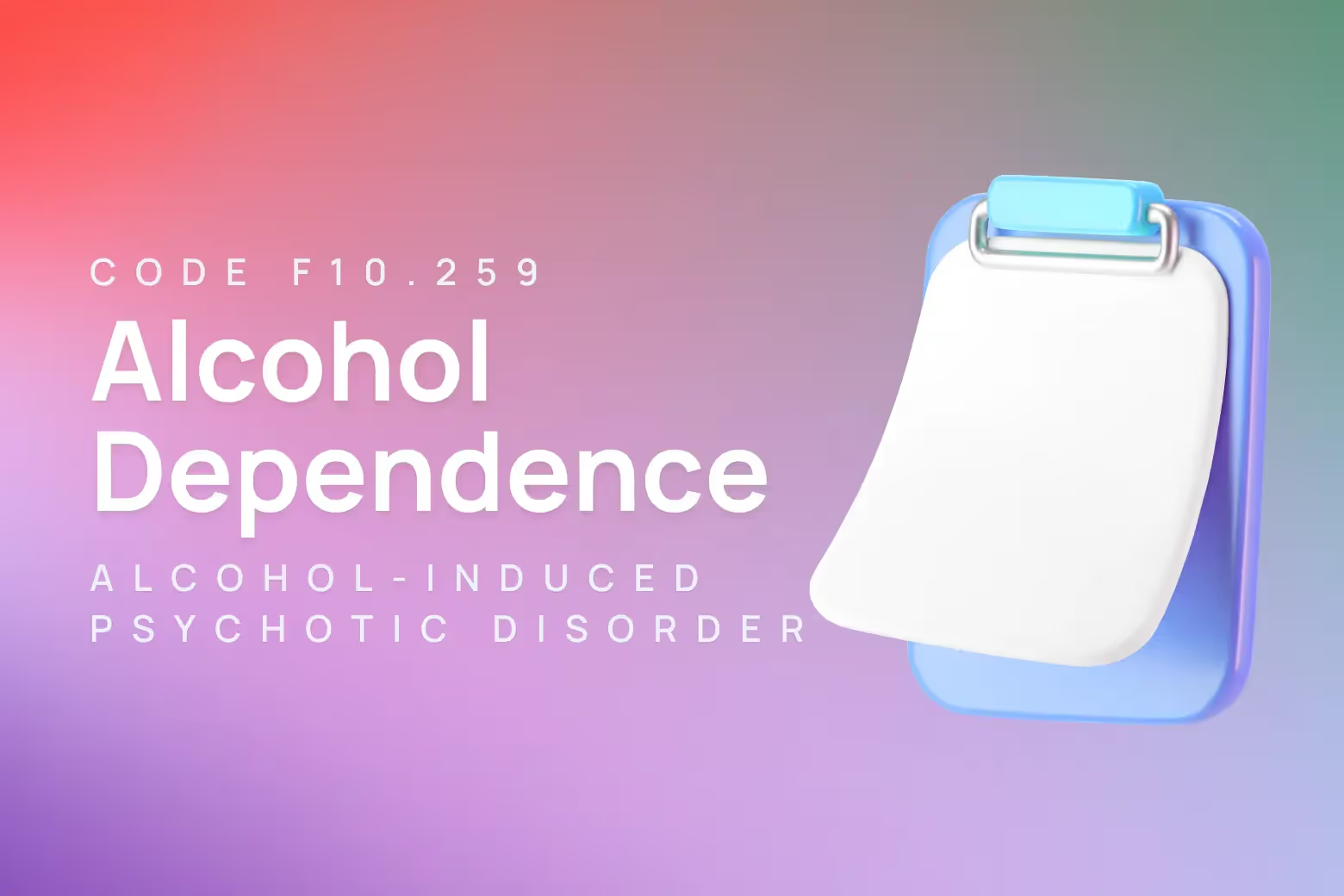ICD-10 code for alcohol dependence with withdrawal, unspecified

F10.239 is the ICD-10 code for alcohol dependence with withdrawal, unspecified.
This code represents cases where alcohol withdrawal syndrome is present alongside diagnosed alcohol dependence, but the specific type of withdrawal cannot be determined or documented.
Accurate diagnosis and proper documentation are critical for ensuring appropriate treatment planning and reimbursement.
Key features:
- Used when alcohol withdrawal accompanies dependence but cannot be further specified
- Requires evidence of both alcohol dependence criteria and withdrawal symptoms
- Distinguished from other F10.23 codes by lack of specific withdrawal complications
- Supports comprehensive treatment planning including medically supervised withdrawal management

Diagnostic criteria for alcohol dependence with withdrawal (F10.239)
Clinicians must establish both alcohol dependence and withdrawal syndrome to assign this code properly.
The underlying alcohol dependence diagnosis requires meeting at least two criteria within a 12-month period. These include:
- consuming alcohol in larger amounts than intended
- persistent unsuccessful efforts to reduce use
- excessive time spent obtaining or recovering from alcohol
- strong cravings or urges to drink
Additional criteria encompass:
- continued use despite social or interpersonal problems
- abandoning important activities due to alcohol
- recurring use in hazardous situations
- persistent use despite physical or psychological problems caused by alcohol
Physiological markers include:
- tolerance requiring increased amounts for desired effects or diminished effects from consistent amounts
- withdrawal syndrome or using alcohol to prevent withdrawal symptoms
The withdrawal component develops when clients experience characteristic symptoms following cessation or reduction of alcohol use.
Withdrawal typically begins 6 to 24 hours after the last drink and may occur even while blood alcohol levels remain elevated in severely dependent individuals.
When to use F10.239 diagnosis code
Proper differential diagnosis ensures appropriate code selection within the F10.23 category.
F10.239 vs F10.230 (Alcohol dependence with withdrawal, uncomplicated)
F10.230 applies when withdrawal symptoms remain mild to moderate without severe complications. Use F10.230 for clients experiencing basic withdrawal features like tremor, sweating, anxiety, and sleep disturbances without progression to seizures, delirium, or hallucinations.
F10.239 becomes appropriate when clinical information is insufficient to determine whether withdrawal is uncomplicated or complicated, or when documentation lacks specificity about withdrawal severity and complications.
F10.239 vs F10.231 (Alcohol dependence with withdrawal, delirium)
F10.231 requires clear evidence of delirium tremens or alcohol withdrawal delirium. This involves disturbance of consciousness, cognitive changes, confusion, disorientation, and typically occurs 2-3 days after cessation.
Choose F10.239 when withdrawal symptoms are present but delirium cannot be confirmed or ruled out through clinical assessment.
F10.239 vs F10.232 (Alcohol dependence with withdrawal, with perceptual disturbance)
F10.232 applies when clients experience hallucinations or perceptual disturbances without delirium. These may include visual, tactile, or auditory hallucinations occurring during withdrawal phases.
F10.239 serves as the appropriate choice when perceptual disturbances cannot be clearly documented or differentiated from other withdrawal symptoms.
Related ICD-10 codes
- F10.23 - Alcohol dependence with withdrawal
- F10.230 - Alcohol dependence with withdrawal, uncomplicated
- F10.231 - Alcohol dependence with withdrawal, delirium
- F10.232 - Alcohol dependence with withdrawal, with perceptual disturbance
- F10.20 - Alcohol dependence, uncomplicated
- F10.10 - Alcohol use disorder, mild
Interventions and CPT codes for alcohol dependence with withdrawal
Evidence-based treatment approaches address both the immediate withdrawal management and long-term recovery planning.
Medical withdrawal management
Initial assessment and stabilization using CPT code 90791 for comprehensive psychiatric diagnostic evaluation. This includes detailed substance use history, mental status examination, and withdrawal severity assessment using standardized scales like CIWA-Ar.
Ongoing medical monitoring during withdrawal uses symptom-triggered or fixed-dose benzodiazepine protocols. Diazepam remains the first-line medication for preventing withdrawal complications including seizures and delirium tremens.
Psychotherapeutic interventions
Cognitive Behavioral Therapy represents the most extensively evaluated psychosocial treatment, typically involving 12 weekly sessions focusing on identifying triggers, developing coping strategies, and relapse prevention. Bill using CPT codes 90832, 90834, or 90837 based on session duration.
Motivational Interviewing effectively addresses ambivalence about change and strengthens commitment to recovery. This approach works particularly well as a prelude to more intensive interventions and can be billed using the same psychotherapy codes.
Coping skills training teaches alternative strategies for managing situations that previously triggered drinking. This includes communication skills, stress management, and drinking refusal techniques integrated into individual therapy sessions.
Group and family interventions
Group psychotherapy using CPT code 90853 provides peer support and relapse prevention skills in a cost-effective format. Groups focus on maintaining abstinence, managing triggers, and building recovery networks.
Family therapy (CPT codes 90846 and 90847) addresses relationship dynamics, codependency patterns, and family involvement in recovery planning.
Screening and brief intervention services
Use CPT codes 99408 and 99409 for structured alcohol screening combined with brief intervention lasting 15-30 minutes or longer than 30 minutes respectively. Medicare beneficiaries may use HCPCS codes G0396 and G0397 for similar services in appropriate settings.
How Upheal improves F10.239 ICD-10 documentation
Upheal's clinical documentation platform supports comprehensive care for clients with alcohol dependence and withdrawal through intelligent automation and clinical decision support.
Suggesting appropriate ICD-10 codes based on session content
The platform analyzes session notes and clinical presentations to recommend the most accurate F10.23 codes.
When withdrawal symptoms are documented but specific complications remain unclear, Upheal helps clinicians recognize when F10.239 provides the most appropriate diagnostic classification.
Smart suggestions consider both DSM-5 criteria and clinical presentation patterns, reducing coding errors and supporting proper reimbursement. The system learns from clinical documentation patterns to improve code accuracy over time.
Maintaining HIPAA-compliant records with proper diagnostic coding
Upheal ensures all documentation meets regulatory requirements while supporting clinical decision-making.
The platform enables clinicians to maintain secure, encrypted records that integrate diagnostic codes with treatment planning and progress monitoring.
Automated prompts help clinicians document withdrawal assessment findings, severity ratings, and treatment responses needed for proper diagnosis coding and care continuity.
Reducing administrative burden so you can focus on client care
By automating routine documentation tasks, clinicians spend more time on direct client care and clinical assessment.
The platform generates compliant progress notes that incorporate diagnostic criteria, treatment interventions, and clinical observations.
This efficiency becomes particularly valuable during withdrawal management when frequent monitoring and documentation are essential for client safety and treatment effectiveness.
Supporting clients with alcohol dependence and withdrawal
Treatment success depends on comprehensive assessment, appropriate medical management, and coordinated psychosocial interventions.
Withdrawal management requires careful monitoring for complications while simultaneously beginning engagement in longer-term recovery planning.
Many clients benefit from residential treatment settings that provide 24-hour medical supervision and intensive therapeutic programming.
The transition from acute withdrawal management to ongoing recovery support represents a critical period requiring coordinated care planning.
Integration between withdrawal services, outpatient therapy, and community support resources improves long-term outcomes.
Upheal's documentation platform supports this comprehensive approach by maintaining detailed records across treatment phases and facilitating communication between providers.
The automated progress notes and diagnostic coding help ensure continuity of care while reducing documentation burden on clinical staff.
Try Upheal for free to experience how intelligent documentation can improve both clinical outcomes and practice efficiency.













